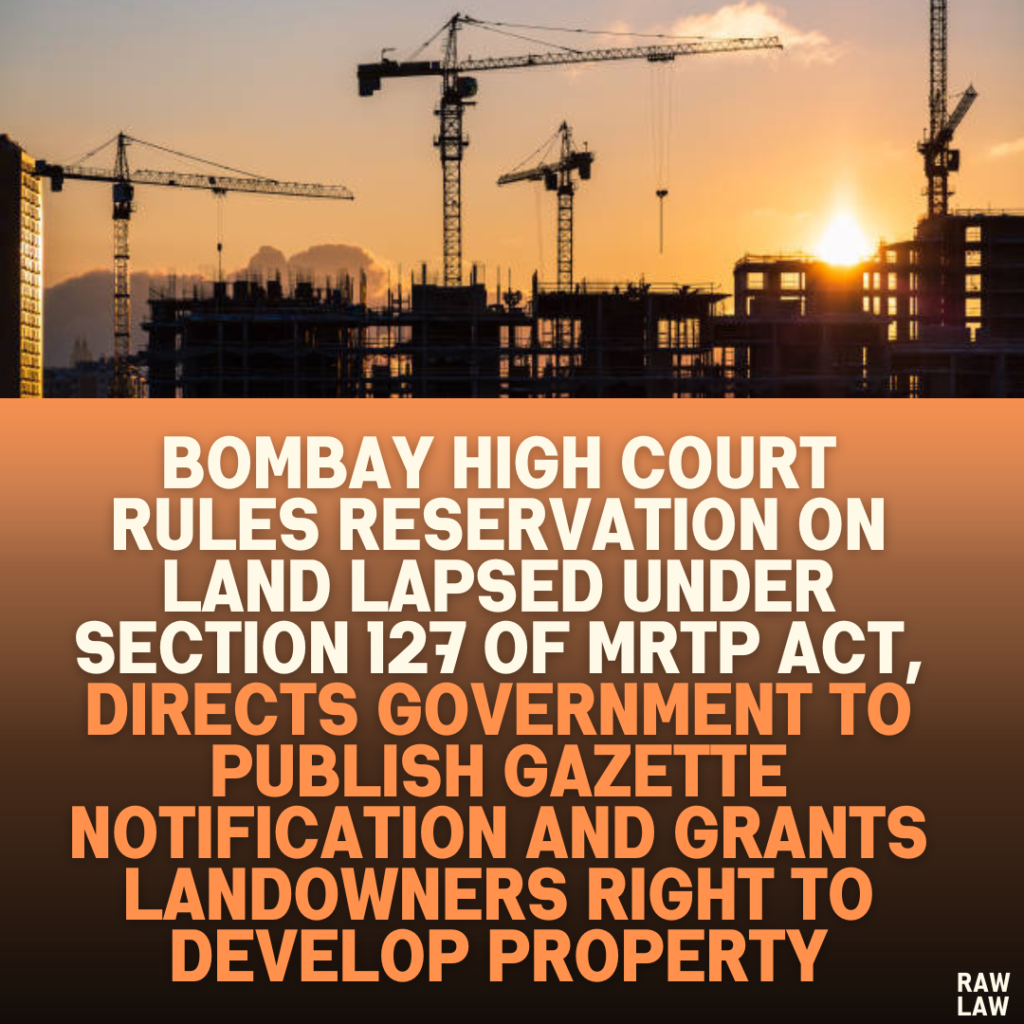1. Court’s Decision:
- The High Court ruled in favor of the petitioners, declaring that the reservation imposed on their land had lapsed under Section 127 of the MRTP Act.
- The Court directed the state government to publish a notification in the Official Gazette confirming the lapsing of the reservation.
- It also held that the petitioners have the right to develop the land without further obstruction from authorities.
- The municipal corporation cannot delay development permissions, as the notification in the Official Gazette is a mere ministerial act and not a fresh decision-making process.
2. Facts of the Case:
- The petitioners owned a large parcel of land that was originally agricultural but later incorporated into municipal limits.
- The municipal corporation, as the planning authority, reserved portions of the petitioners’ land for a primary and high school under a Development Plan (1999).
- The petitioners applied for development permission, which was granted but required conversion from agricultural to non-agricultural land.
- In 2004, the state government sanctioned the development plan, keeping the reservation in force.
- The municipal corporation issued a certificate in 2016 confirming the reservation still applied.
- The petitioners issued a purchase notice in 2019 under Section 127, claiming that no steps had been taken for acquisition in over ten years.
- The municipal corporation requested additional documentation, but no actual acquisition steps were initiated.
- The petitioners filed a writ petition in 2022, seeking a declaration that the reservation had lapsed.
3. Issues Before the Court:
- Did the reservation lapse under Section 127 of the MRTP Act due to the failure of authorities to take acquisition steps within the statutory time limit?
- Does offering Transferable Development Rights (TDR) or Floor Space Index (FSI) constitute an effective acquisition step under the law?
- Can the petitioners develop the land without further legal obstacles?
4. Petitioner’s Arguments:
- The municipal corporation failed to acquire the land within ten years, triggering their right to issue a purchase notice under Section 127.
- The corporation had 24 months from the purchase notice (2019) to acquire the land, but it did nothing substantive.
- Offering TDR or FSI is not equivalent to initiating land acquisition, as per Supreme Court rulings.
- Since the statutory 24-month period expired without acquisition, the reservation automatically lapsed.
- The petitioners now have full rights to develop the property under permissible land use rules.
5. Respondent’s Arguments (Municipal Corporation & State):
- The petitioners did not submit necessary documents with their purchase notice, which delayed the process.
- The municipal corporation offered TDR/FSI as compensation, which it claimed should be treated as an acquisition step.
- The petitioners rejected TDR/FSI, slowing down the resolution of the matter.
- The state and municipal authorities argued that procedural delays should not automatically lead to lapsing of reservation.
6. Analysis of the Law:
- Section 127 of the MRTP Act states that if a land reserved for public use is not acquired within ten years, the owner can serve a purchase notice.
- After such a notice, the planning authority has 24 months to either:
- Acquire the land, or
- Take effective steps to do so.
- If neither happens, the reservation lapses by law, and the land must be treated as unreserved.
7. Precedent Analysis:
- Girnar Traders v. State of Maharashtra (2007)
- The Supreme Court held that merely applying for acquisition is not enough.
- Actual steps (such as issuing a declaration under the Land Acquisition Act) must be taken.
- Shrirampur Municipal Council v. Satyabhamabai Bhimaji Dawkher (2013)
- Failure to act within the statutory timeframe results in automatic lapsing of reservation.
- Arun Motiram Nimkar v. Municipal Corporation of City of Amravati (2013)
- Once reservation lapses, landowners can develop the land without unnecessary bureaucratic hurdles.
8. Court’s Reasoning:
- The municipal corporation failed to take effective steps toward acquisition within 24 months of the purchase notice.
- TDR or FSI is not a substitute for land acquisition.
- The municipal corporation engaged in unnecessary correspondence instead of acquiring the land.
- The law explicitly states that if no action is taken within the statutory period, the reservation lapses automatically.
- The state government’s role in publishing a notification is ministerial—it cannot be used to obstruct the petitioners’ rights.
9. Conclusion:
- The High Court declared the reservation had lapsed due to the failure of authorities to act within the legal timeframe.
- It directed the state government to issue an Official Gazette notification confirming the lapse within six weeks.
- The petitioners can proceed with development without further bureaucratic delays.
10. Implications of the Judgment:
Strengthens landowners’ rights: Ensures that authorities cannot indefinitely reserve land without compensation.
Encourages timely action: Planning authorities must act within statutory timeframes to avoid losing control over reserved land.
Clarifies the limits of TDR/FSI: This ruling reinforces that offering TDR or FSI does not count as a step toward land acquisition.
Reduces administrative delays: Once reservation lapses, landowners should not face unnecessary delays in obtaining permissions.
Influences future town planning decisions: Encourages better planning and accountability in land reservation policies.
